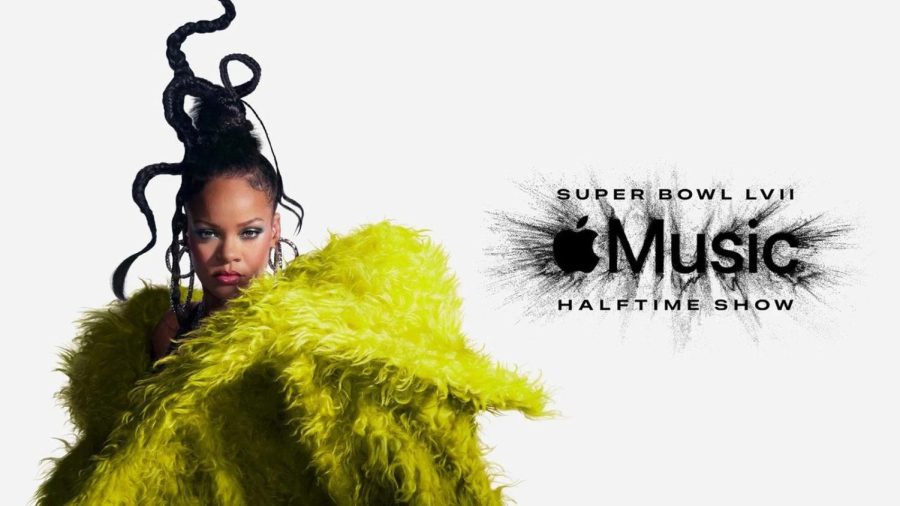What Rihanna’s pregnancy announcement can teach us about women’s bodies in the news
February 24, 2023
On Super Bowl Sunday, millions of Americans congregated around the TV to watch two teams face off to win the Vince Lombardi Trophy. For some, this day is about football. For others, Super Bowl Sunday means an “epic” halftime show. This year, Rihanna performed the halftime show where she seemed to hint at being pregnant.
The performance began with her descending from the sky in an all-red outfit, “cradling” her belly. This wasn’t the only instance of her pointing to the fact that she could be pregnant either. There were several other instances of her caressing her belly during the rest of the halftime show. This led to online speculation over whether Rihanna was pregnant again, which was later confirmed by her representative.
While she did hint at being pregnant, a lot of the speculatory comments were based on her body and the way she seemed to have a “baby bump.” Not having a “flat stomach” doesn’t mean you’re pregnant, yet if women have any sort of “bump” or “fat” on their stomachs they’re either viewed as pregnant or “unhealthy.”
What would’ve happened if the speculation was just that— speculation? Rihanna’s first baby was born in May 2022, about nine months ago. Postpartum fat typically takes six months to a year to lose. Rihanna said that motherhood inspired her to agree to do the halftime show, so her stomach cradling could’ve been an attribution to her son.
A lot of the stigma surrounding not being skinny can be contributed to the media. It isn’t uncommon for the media to make a story out of celebrities’ bodies, especially women’s bodies. From headlines on TV news broadcasts to the magazine covers you see in stores while waiting to check out, fatphobic ideas are constantly being thrown in our faces.
Ella Higgins and Sadie Hyde are both sophomores at Ida B. Wells high school they both shared their views on the media’s impacts on body image. “It is very unlikely to see anything positive in media, especially about women’s bodies,” said Hyde. “Or like everyone’s bodies in general, like this celebrity has a ‘dad bod’ look at them. They need to do this, and this is how Chris Pratt keeps a six-pack.”
Higgins pointed out that it isn’t just headlines making these comments, but also social media platforms like Tik Tok and Instagram. “I see a lot of like facial and skin stuff,” said Higgins. “I’m not sure if you’ve seen like on Tik Tok but these things are like, ‘interact to claim clear skin, beautiful hair, long nails,’ all of these things like saying your acne is bad, having braces is bad, different types of bodies are bad. Like having a boxy body is bad. Just saying that these things that people naturally have are bad is not always the best thing.”
When you’re constantly interacting with content that’s making comments on the way you look or appear it can make you feel insecure. “It’s like seeing those like diets and those pictures of celebrities that are so close to mid [sized] but then they’re like, wow, look at them in a bathing suit,” said Hyde. “And it’s like, look at that. like why would they even go out in public in a bathing suit and it’s like I go out in public in a bathing suit when I’m on vacation and stuff and I’m seeing that it’s like oh, is that what people are thinking when they look at me?”
Higgins and Hyde both agreed that news stories and headlines created about somebody’s body were something they didn’t consider newsworthy. “I usually feel upset because no one should ever have to feel bad about their appearance and how their body looks,” said Higgins. “When people make comments on other people’s bodies, it makes other people that have those body types feel bad about their bodies.”
“I think it’s extremely unnecessary in a lot of ways because usually, it’s not even a productive article,” said Hyde. Many of the articles published about Rihanna were focused on making speculations about her pregnancy or how her performance was “overly sexual” for a pregnant woman. More productive headlines could surround the fact that Rihanna was the first pregnant person to perform at the halftime show.
Rihanna is an example of a proud and confident woman. Her halftime performance shows that you can still work and perform as a mother and that motherhood isn’t a hindrance but something to take pride and confidence in.
While there is still a large majority of media coverage focusing on making peoples’ bodies the main point of a “story,” there has been an increase in body positivity in the media. However, it’s now obvious, from commentary following The Super Bowl, that we still have work to be done.
“I feel like for me personally, when I see Gigi Hadid has an amazing body and other models especially, a lot of the time like, wow, I wish I looked that way,” said Higgins. “But then I’m like, well, I shouldn’t be thinking that because, my body is mine and no one else looks like I do, and I’m pretty great.”



